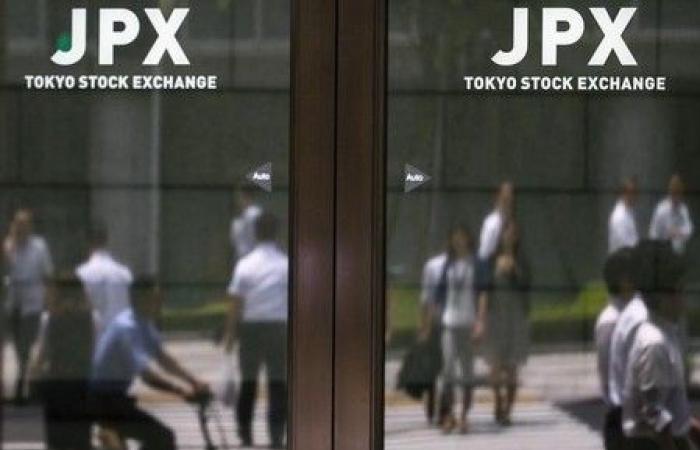Tokyo (awp/afp) – The Shanghai and Hong Kong stock exchanges opened sharply higher on Monday, welcoming the economic recovery measures unveiled Friday by Beijing, while the Tokyo Stock Exchange fell, reacting in particular to the election of the next Japanese Prime Minister.
In Tokyo, the flagship Nikkei index dropped 5.06% to 37,812.33 points around 05:21 GMT and the broader Topix index lost 3.69% to 2,639.69 points.
The Shanghai market gained more than 8% around 2:40 p.m. (06:40 GMT), while that of Shenzhen gained more than 10%. The Hong Kong Stock Exchange is up more than 3%.
Beijing announced on Friday the reduction in the required reserve ratio (RRR) of banks, which should make it possible to inject some 127 billion euros of liquidity into the financial markets, thus allowing banks to lend more to companies to support the economy real.
China also announced a cut from 1.7% to 1.5% in the seven-day reverse repo rate, a short-term interest rate paid by the central bank on borrowing from commercial lenders.
On Monday, the eastern metropolis of Shanghai and the gigantic southern cities of Guangzhou and Shenzhen unveiled relaxations of restrictions on home purchases.
The shares of the developer Kaisa, one of the emblematic Chinese groups affected by the crisis in the real estate sector, gained nearly 60% on Monday, those of Fantasia more than 30% and those of Sunac more than 16%.
Tokyo a replica
Opposite trend for the Japanese markets, which started “in sharp decline due to the significant appreciation of the yen against the dollar, but also the caution aroused by the election of (…) Shigeru Ishiba, who mentioned a strengthening the taxation of financial income and an increase in corporate tax,” commented Toshiyuki Kanayama, analyst for the Japanese financial services group Monex.
After the stock market closed for the weekend on Friday, Shigeru Ishiba, former Minister of Defense and Agriculture, was elected leader of the Liberal Democratic Party (LDP). He will succeed Fumio Kishida as Prime Minister of Japan on Tuesday.
During his campaign for leader of the LDP, Shigeru Ishiba, 67, pledged to stimulate the economy by encouraging national investment in the technology sectors of chips and artificial intelligence.
Furthermore, on the foreign exchange market, the rebound of the yen against the greenback had led to the sale of a wide range of stocks, particularly affecting the technology sectors and those linked to exports.
The Japanese currency was worth 142.01 yen to the dollar, compared to 142.21 yen on Friday at 9:00 p.m. GMT.
On the value side, the strength of the yen caused values linked to exports to fall significantly, particularly in the automobile sector, penalizing the shares of Toyota (-7.90%), Honda (-6.96%). or even Nissan (-5.39%).
In Tokyo, chip-related stocks also fell: Tokyo Electron lost 7.04%, Disco Corp 7.32% and Advantest 6.14% around 05:30 GMT.
The euro was stable at 158.60 yen against 158.74 yen, and was trading for $1.1168 instead of $1.1162 on Friday.
On the oil market, the price of a barrel of American WTI rose 0.45% to $68.49 around 05:16 GMT and that of Brent from the North Sea gained 0.51% to $72.35 around 04:52 GMT.
afp/al






